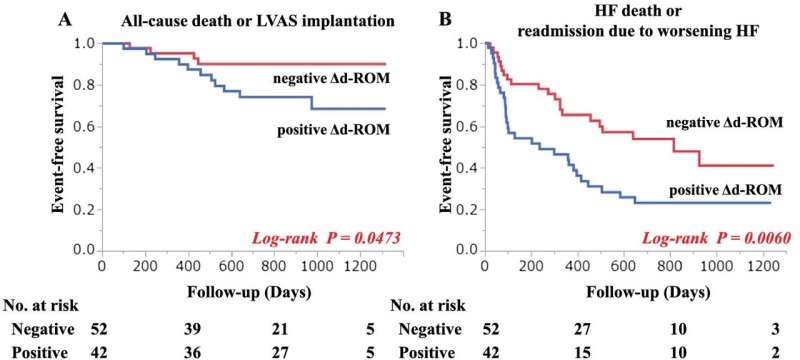Tailoring exercise therapy to individual heart failure patients

While exercise therapy for heart failure (HF) patients with low heart function has been shown to be an effective prognostic tool, the level and format of exercise that yields optimal effects is still unclear. In a study to understand how exercise-induced oxidative stress affects patients with HF, researchers from the Osaka City University (OCU) Graduate School of Medicine have shown that patients who underwent a cardiopulmonary exercise test and showed an increased in oxidative stress had a poor prognosis. Their findings were published in the European heart journal: ESC Heart Failure.
"These results show that for patients with acute decompensated heart failure, any form of exercise may not be the most effective prognostic tool," suggests Atsushi Shibata, research lead and assistant professor at OCU Department of Cardiovascular Medicine, "we need to know what type of exercise and the degree of intensity that is best fit for each patient and measuring levels oxidative stress shows promise."
From July 2013 to March 2015, the study drew 94 participants from a cardiac rehabilitation program after being admitted into Osaka City University Hospital for worsening HF. Diacron-reactive oxygen metabolites (d-ROM) values, a marker of oxidative stress, were taken from patient blood samples before and after they performed a cardiopulmonary exercise test with enough exercise to make them aware of the load. The team defined Δd-ROM as the change in d-ROM values before and after the test and then examined its relationship with prognosis.
During the follow-up and analysis period, results showed that all-cause mortality was significantly higher in the Δd-ROM-positive group than in the Δd-ROM-negative group and rehospitalization for heart failure was also significantly higher in the Δd-ROM-positive group. This correlation remained a steady prognostic factor regardless of body size or exercise tolerance.
Exercise may be beneficial in heart failure patients when it enhances antioxidant capacity and reduces oxidative stress, but "this study shows it may be detrimental if it further enhances oxidative stress," concludes Assistant Professor Shibata.
"To tailor exercise therapy for heart failure patients, it is necessary to show that the exercise style and the oxidative stress derived from the exercise amount is more effective than conventional exercise therapy," states Associate Professor Yasuhiro Izumiya. "In addition, these results show the importance of clarifying the mechanism by which exercise-induced increase in oxidative stress adversely affects HF prognosis."
More information: Atsushi Shibata et al, Increased oxidative stress during exercise predicts poor prognosis in patients with acute decompensated heart failure, ESC Heart Failure (2021). DOI: 10.1002/ehf2.13538


















